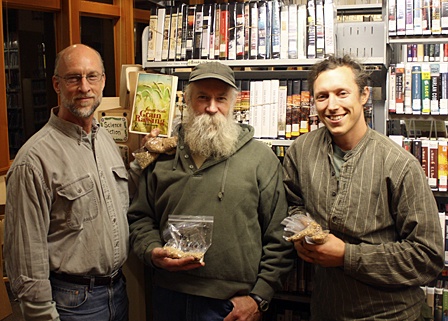Darwin wheat. Pearl triticale. Charles barley. Tim Peters Red.
The names of these grains appeal to the farmer in all of us. But you don’t have to be a farmer to get your hands dirty planting any of these grain varieties.
Sustainable Orcas Island is performing a grain growing project by testing several seed varieties. Designed by Dan Borman, the project will help determine what grains can be grown on the island most viably. The project needs islanders’ help.
“You don’t have to be an expert,” organizer Phil Heikkinen said.
Reflecting the national trend promoting local food consumption, Orcas volunteers will further the movement here by testing grain seeds in their own plots. The project asks volunteers to get the seeds planted by the end of the month.
“Everybody agrees we need to learn more about growing food crops that provide substantial nutrition,” Heikkinen said.
The grain growing test project is already underway with 10 volunteers who have planted at least a two rows containing 12 types of grains. The grains include eight varieties of wheat, two varieties of rye, one triticale, and one barley in a kit provided through Sustainable Orcas Island.
Volunteers are asked to pay $8 per kit to help cover costs and to test the seeds in a deer-proof plot. Not a lot of space is needed to help, only 50 to 100 square feet. No special soil amendments are required; volunteers are simply asked to note the soil’s characteristics. Volunteers will map and follow each sample as it grows. The results will be shared through next year’s growing season. If kept in a cool, dry place, the seeds produced will be viable for planting for years into the future.
According to Sustainable Orcas Island, it will become increasingly important for local residents to grow more of their own food. Grains are one of the most nutrition-rich foods available and it is believed they can be grown productively by individuals on a small scale.
“The goal is to develop a few varieties of wheats, ryes, and barleys that are relatively easy to process and to support the seed bank,” Heikkinen said. “If we can find out what grows best here, we can grow more food here.”
To sow your own test grains, including Junipers, Lamberts, Marks Reds and Neeley winter wheats, contact Phil at 376-4985 or email phil.heikkinen@gmail.com. To learn more about growing test grains on Orcas, email Dan at dan.borman.food.plants@gmail.com.




